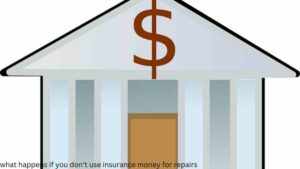The Risks of Not Using Insurance Money for Repairs
What Happens if You Don’t Use Insurance Money for Repairs? Insurance money to cover damages resulting from a homeowner’s insurance policy is intended to be used to make repairs to your house and that’s exactly the purpose you should use it to do. First of all, it’s just a matter of practicality.
Discover the potential risks and consequences, including decreased property value, policy issues, and lender requirements, of not using insurance payouts for their intended purpose. Insurance is intended to offer a financial security net in times of crisis, especially when an unexpected loss is caused to your property. Once the claim is approved and a settlement is issued, homeowners may wonder whether they must use the funds to make repairs. If you choose not to utilize the money from insurance for its intended purpose? Here’s a complete analysis of the possible implications and the implications.
Understanding Insurance Payouts
If you claim damages, be it from the fire, storm, or any other occurrence, company evaluates them and then determines an amount to pay by repair costs. The money is meant to restore your home to its condition before damage. But, the money does not come with a legal obligation to spend on repairs. However, there are a variety of things to think about.
Mortgage Lender Requirements
If you’re a homeowner with a mortgage, the lender is probably listed as co-insured under the homeowner’s insurance policy. So, any payouts will typically be payable to you and the lender. In most cases, the lender will request that the money be used to repair their property to ensure their investment. Here’s why:
- Protection of Investment: The property is used as collateral for the mortgage. If it isn’t repaired and then loses value or becomes unlivable, the lender’s financial interest is in danger.
- The Control of Disbursement Most of the time, the insurance money is kept in an escrow with the lender and then released in small increments when repairs are completed. This makes sure that the money is utilized promptly.
Potential Consequences of Not Making Repairs
- Additional Damage Failure to fix the initial damage could cause more serious and costly problems. For example, a minor roof leak that is not addressed can cause significant mold and water damage.
- Terms of the Insurance Policy Future claims could be refused if the insurer finds that prior damages led to the creation of new ones. The insurance company expects the repairs to be completed to stop further loss.
- Reduced Value of Property A damaged property that is not fixed can drastically decrease the price of a home. This can become a problem should you decide to sell your property.
- Legal and financial repercussions: If the damage causes the property to be unsafe and you choose to sell the property without revealing the issue you may be subject to legal actions against the prospective buyer.
Alternative Uses of Insurance Money
In certain circumstances, homeowners might think about together an insurance settlement for other purposes beyond repairs, like:
- Debt repayment The idea of using the funds to pay off high-interest debt may sound appealing. However, it’s not without risk, particularly in the event that repairs are not completed on time.
- Savings: Putting the money into an emergency fund could be a temporary solution. However, it will not reduce the risk of unaddressed damages.
- Upgrades A few might think of with the funds to fund renovations or improvements to their home. Although this could be beneficial, it’s essential to prioritize repairs needed to preserve the property’s integrity.
Ethical and Practical Considerations
While there isn’t any immediate legal requirement to use the insurance money for repairs, ethically, it is important to consider the reason. The funds are intended to pay for the costs of renovating your house and ensure it is safe and habitable. The misuse of these funds could result in significant problems later on, not only for you but for the future owners
The Benefits of Using Insurance Money Wisely
Insurance acts as a financial security net, shielding our assets from unexpected events that can cause major damage to our vehicles, homes, and other assets. The insurance payment can be life-saving if a catastrophe occurs and a claim is approved. What are the advantages of together the money in a wise manner? Let’s look at the many benefits of properly utilizing insurance funds.
Restoration and Peace of Mind
The most important advantage of insurance funds is their capacity to repair damaged property. With the benefit of together the funds to make needed repairs, you can:
- Restore normalcy quickly. Addressing the damage lets you return to your normal routine without the hassle of being in a damaged home.
- Improve Safety The repairs assure that your home remains secure and habitable, thus preventing dangers to your health or accidents.
- The peace of mind that comes from knowing that your home is restored to its original condition or better will significantly lessen anxiety and stress.

Financial Protection
Making use of insurance money for its intended purpose could grant significant financial security:
- Cost savings: Remediating damage quickly can stop further deterioration, which may lead to more costly repairs later on.
- Preservation of Value of Property Maintaining your property in good order will maintain or even improve its value, which is vital when you intend to sell it in the near future.
- Beating the burden of debt: If you don’t have insurance, you could obtain loans to cover repair costs, leading to higher debt. Insurance payments help eliminate this financial burden.
Conformity with lender requirements
If you’re in the market for a mortgage, your lender is likely to have an unalienable interest in how insurance funds are spent.
- Escrow accounts Most lenders require the insurance payouts to be placed into an escrow account, specifically to make repairs. This will warrant that the property is an acceptable collateral for loan.
- Loan Terms Conformity The use of the money in the manner you intended will benefit you remain within the confines of your mortgage agreement, while avoiding potential legal problems or conflicts with your lender.
Eligibility for Future Claims
Incorrectly together insurance funds can impact your ability to file claims in the future:
- Policy Adherence to Terms Insurance companies expect repairs to be completed to avoid further damage. Failure to adhere to this can result in denying future claims if the initial damage causes new problems.
- Continued coverage: Ethical use of insurance funds will ensure that you are on good terms with the insurance company and maintain your coverage without any increases in premiums or cancellations.
Ethical Responsibility
The use of insurance payouts in the manner intended conforms to the ethical standards of integrity and fairness:
- Fulfilling the insurance Contract: If you receive an insurance payment, it is based on an agreement that the money will be used to rebuild the insured property. The misuse of these funds could be viewed as a violation of the contract.
- Social Impact Maintaining your property can contribute to your community’s overall well-beingwell-being and aesthetics and indirectly increase its property values and security.
Long-Term Benefits
The investment of insurance funds in restoration and repairs has advantages over the long run:
- Higher Equity in the Home Regular maintenance and punctual repairs boost your home’s Equity and give a financial cushion to ensure your home’s future.
- Enhanced Livability A maintained home will serve a better quality of life and less disruptions and repairs required over the long term.
- Marketing Appeal: If you sell your home, a well-maintained property will draw more potential buyers and could lead to higher bids.
.
Conclusion
There is a certain amount of freedom in using your insurance settlement; the most efficient method is to apply the funds for the intended purpose – repairing the damage. This will warrant the security and value of your property, fulfilling the insurance protection purpose. Without necessary repairs, you could cause a series of issues, ranging from damages to your property to legal matters. The short-term advantages of using money elsewhere seem insignificant compared to the longer-term effects.








